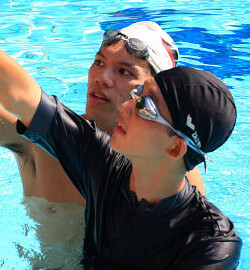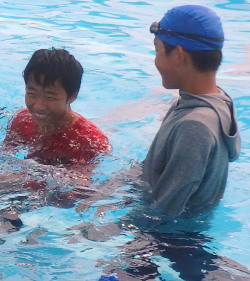Indoor Pools
Even though they sometimes seem restrictive, swimming pool rules exist for a reason. They ensure the health and safety of all pool visitors.
Hygiene
Generally, standard swimming pool rules require proper swimming attire, made of fibres that don't drop fluff into the filter systems. Another reason is to reduce the bacterial load and avoid discolouration of the water. If they would allow the people to swim in inappropriate wear, they would need to put in more treatment chemicals, which means, it will require higher maintenance.
Only wear your swimsuit or clean clothes in the pool.
Don’t go in with a shirt or shorts you have worn all day.
Don’t enter the pool when dirty.
Always shower first in all your swimwear.
The pool is not your bathtub.
Keep the Pool Clean
The purpose of clothing rules is to minimise the bacterial load by ensuring that nobody can thoughtlessly rinse their dirty clothes in the swimming pool. Pool filters keep the water nice and clear, unless they get clogged up with fluff and dirt. That's why most pools prefer clean swimwear with manmade fibres as they don't shed fluff. Otherwise the pool chemicals would have to be monitored and topped up more often, "just to be on the safe side". More chlorine means more stinging eyes and faster rotting swimwear.
Recently, dress codes in many pools have been relaxed to allow for additional modesty. Many public swimming pools allow T-shirts in the water, but do not allow other street clothes into the pool, except for survival or lifesaving training.
Many public swimming pools allow clean nylon clothes in the water.
Some pool operators allow you to swim in clothes if you bring an extra set to swim in.
This rule tries to maintain a clear distinction
between clothes worn in the pool and street clothes worn outside.
Just ask and check the pool rules before swimming in clothes.
Your swimwear should not limit your ability to move or be too heavy for you.
These clothing rules may be modified for special training classes.
Wear any new swimwear first in the bath or shower to remove any chemical residue from manufacturing.
Acceptable Swimwear
- Shorts, briefs, jammers, leggings or tights
- Swim shirts, rash guards, water shirts
- Full body swimsuits or shorties
- Light sportswear
- Triathlon attire if it is swim appropriate
Non Acceptable Swimwear
- Swimwear with exposed zippers, buckles, or metal ornaments
- Cotton shirts and hoodies, unless used for swimming only
- Denim, jeans, or cut-offs
- Lifeguard clothes because they can cause confusion with regular lifeguards
Swim Caps and Hoods
Swim caps and hoods have a number of advantages. First of all, they protect your hair more from chlorine and other pool chemicals. Second, they avoid those woolly hair aggregates at the bottom of the pool, and also keep the pool filters cleaner.
Some swimsuits come with a build-in hood that doesn't come off and get lost in the pool. It is used to lessen the friction of the water and gain more speed in gliding. It also avoids distractions when swimming, specially for swimmers with long hair.


Special Events
Swimmers maybe allowed or required to wear clothes in the pool for special events. Charity swims may include swimming fully clothed for a number of sponsored lengths.
Water games often involve teams to dress up in special colours. Clothes may be used as special handicap. Hoodie relay swims require passing on a wet hoodie to the next swimmer in your team.
Water safety lessons teach rescue skills and swimming in clothes for a realistic experience. Climbing into boats fully clothed is a skill that could save lives and is great fun to practice.
Aquatic bootcamps require you to wear clothes in the water during the entire course. This builds strength and fitness much faster.
What About Goggles?
Goggles are often needed for swimming.
The can help you to be more at ease in the water.
Kids easily get their confidence with water when they have used goggles at an early age even if it was just for recreation.
The may also help build more focus in learning swimming skills.
The main purpose of goggles is to protect your eyes from the harmful chemicals and dirt from water.